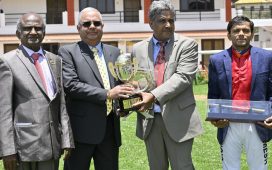“The state police called me. They just found his body in the woods.”
“He is dead”
“Yup, I told you. They found his body in the woods and I guess she is going to be … I mean she gave us so many stories. That he was in rehab. He went there. He went there. She had to … they either had to kill him or did he actually get drunk and go out into the woods and dies. Who knows.”
So begins the transcript of a telephone call that’s one of the more sensational pieces of evidence divulged thus far in the ongoing federal doping cases. The transcript was attached to a government motion in November as part of the lesser-reported federal case of Louis Grasso, Donato Poliseno, Thomas Guido III, Richard Banca, and Rene Allard. That case is before a different judge than the monster indictment that includes high-profile Thoroughbred trainers Jorge Navarro and Jason Servis. The Servis et al case saw its first set of defendants go to trial last week, with veterinarian and drug maker Dr. Seth Fishman and sales associate Lisa Giannelli in court.
The Grasso case, which involves primarily harness racing connections, is still trading earlier-stage motions.
In response to one of those motions, prosecutors filed a series of legal arguments, and in one of them, felt the need to clarify the role of defendant Donato Poliseno in the alleged doping scheme. Poliseno, the prosecutors claim, was an animal drug dealer who created and distributed performance-enhancing substances for racehorses outside the regulation of the Food and Drug Administration. Attached to the prosecution’s motion was a batch of transcripts from intercepted phone calls between Poliseno and co-defendant Louis Grasso.
Grasso, while trained as a veterinarian, was not (according to the government) actively practicing, but rather focused on drug distribution and compounding.
The disclosed transcripts are all from phone calls between Poliseno and Grasso, who appeared to be in contact regularly in the fall of 2019. Over a series of calls, Poliseno grew increasingly worried about the death of a man in the woods in Delaware, who appears to have been veterinarian Dr. Edward Conner.
A Gold Alert was issued for Conner on Oct. 11, 2019, informing the public that Delaware State Police were looking for him and that he had been missing since Oct. 2. Conner had last been seen in the area of his home on Pinepitch Road in Harrington, Del., and was apparently not with his vehicle.
The photo attached to the alert shows Conner with a heavily-bandaged face bearing bruises and cuts, which Delaware State Police say was his driver’s license photo. The following day, on Oct. 12, the Gold Alert for Conner was cancelled. Poliseno’s conversation with Grasso took place in the evening on Oct. 11.

Edward Conner. Photo courtesy Delaware State Police
“They sent 10 police cars there and they searched the woods, the property and finally found him. Ain’t that a bitch,” Poliseno said.
“Did they arrest her or no?” asked Grasso.
“I don’t know. They didn’t tell me that. I guess it will hit the papers tomorrow.”
Poliseno then turned the conversation to what Conner’s disappearance and death could mean for him. He had been using Conner’s veterinary license information to purchase drugs for resale, and now he believed he was about to be caught. It never becomes completely clear in the transcripts whether Poliseno was concerned he had dated some prescriptions for a period of time after Conner had disappeared, or if he was afraid the veterinarian’s death might prompt scrutiny of Conner’s or Poliseno’s life and his business associates.
“But it puts me in a lot of trouble,” he tells Grasso. “Because now that they know he is dead I can’t buy it through any suppliers or anything under his license. You know.”
“That’s true,” said Grasso. “Well yeah I guess … I mean who is going to find out right away that he is dead? Nobody … It’s not like they are looking at the newspapers looking.”
“You don’t think that the suppliers would look?” Poliseno said.
“Aaah,” said Grasso.
“I got Boothwyn, Rapid. NexGen is in Texas, they wouldn’t know. Midwest wouldn’t know,” continued Poliseno.
“ …. Till the end of the year. When does his license run out?”
“End of July.”
“Next July?”
“Yup.”
“You might not have a problem until next July.”
“These other vets are going to turn me in if I try and operate.”
“Well that’s a different story.”
From there, the two discuss plans to help Poliseno continue his operations without detection.
“They are closing in on me,” Poliseno tells Grasso in a call on Oct. 15. “Listen, send me a copy of your New Jersey or New York license.”
“What do you mean they are closing in on you?” asks Grasso.
“Well NexGen just told me that Doc Conners, they know he died. You know, and Rapid knows that he died. So now they know that he is dead.”
“Alright,” said Grasso.
“So I said, ‘Send me a copy of one of the licenses in New Jersey.’ Fax me a copy, you got the fax number?”
Poliseno, who said he had $150,000 worth of drugs with Conner’s name on their prescriptions, discussed with Grasso his status with each of the pharmacies he was working with to secure drugs for illegal distribution. Among those mentioned were Boothwyn Pharmacy, which in 2005 was cited by the Pennsylvania Board of Pharmacy for having expired drugs on its shelf during a routine inspection. In 2017, Boothwyn received a warning letter from the Food and Drug Administration alleging it was producing drugs in violation of federal law, including failure to follow certain procedures to prevent contamination or assure sterility. The warning said Boothwyn was producing unapproved new drugs, and compounding drugs “intended for conditions not amenable to self-diagnosis and treatment by individuals who are not medical practitioners.”
“Rapid” seems to be a reference to Pennsylvania-based Rapid Equine Solutions, which was implicated in the death of two racehorses in the spring of 2019 after a technician switched the concentrations of two active ingredients of a medication for Equine Protozoal Myeloencephalitis (EPM). A subsequent FDA inspection found “insanitary conditions,” “potency issues,” and misbranding. In summer 2019, prior to Poliseno and Grasso’s phone call, officials who inspected Rapid Equine Solutions described “an unknown white film on the floor in the sterile production room and debris in the corners of the room.” The inspection also reported several bugs lingering around the sterile and non-sterile preparation areas, while fly tape hung from the ceiling above the laboratory sink. It was also cited by the FDA for selling large quantities of compounds to a veterinarian who distributed them without prescriptions. Rapid has since voluntarily suspended its state pharmacy board licenses.
BRD, also known as Buy-Rite Drugs, is also referenced in their conversations. BRD was the source of an injected supplement that triggered strychnine overages in harness horses in Pennsylvania in 2019. Buy-Rite has also been the subject of state sanctions for shipping sterile compounds to a state where it was not licensed.
According to other documents from prosecutors, Grasso was no stranger to having his license used by laypeople. He allegedly wrote prescriptions as requested by trainers without examining their horses for $100 per script, sometimes making it appear that EPO and other substances were being ordered for treatment of nonexistent horses, or sometimes, a fictional dog named Butch. Grasso also manufactured and sold PEDs, including EPO, red acid, snake venom, and bronchodilators, according to prosecutors. Poliseno is alleged to have recruited Grasso to produce PEDs for distribution through his Delaware-based Equine Veterinary Supply company, including adrenal stimulants, sedatives, and other substances.
It seems Conner, too, was familiar with the notion of having his name used in unconventional ways – around the time of his death, he was the focus of Delaware racing investigators looking into the sad case of Glencairn.
[Story Continues Below]
Glencairn, a 5-year-old son of Candy Ride, suffered a catastrophic breakdown in a $5,000 claiming race at Delaware Park on Aug. 5, 2019. The horse, whose prior start was for a $25,000 tag in April, was a ship-in and a heavy favorite in his August return to the races. A mortality review investigation revealed records indicating the horse had received shockwave therapy five days prior to the race, despite Delaware’s regulation that it not be administered closer than ten days ahead of a race. Shockwave is a beneficial therapeutic treatment to aid in healing, but is also thought to create temporary analgesia, which is why there are limits on its use at the track. Delaware also requires the therapy to be administered by a licensed veterinarian and reported to the commission.
Stewards issued six-month suspensions and $1,000 fines to two licensees in connection with the shockwaving of Glencairn – trainer Anthony Pecoraro and David Neilson, who owned Alpha Omega Farm in Townsend, Del. Neilson has been licensed as an owner and a trainer, but was not the owner of Glencairn. The horse’s owner, who reported the shockwaving to the commission after he got the bill, faced no penalties.
“I met with Mr. Pecoraro later in the week and he indicated that the horse had been mostly training on a farm called Alpha Omega where he was jogging and swimming because he had ankle problems and they didn’t think the horse could handle the everyday training at the racetrack,” read a report from the Delaware Thoroughbred Racing Commission’s safety steward after an August 2019 interview with Pecoraro. “It turns out the horse couldn’t handle racing either.
“Mr. Pecoraro assured me that the horse’s ankles were X-rayed several times for any sign of fractures and it didn’t show anything. I’m just not convinced that training a horse on a farm under someone else’s supervision and then shipping the horse in a few days before the race and running him is a proper way to operate. That horse was away from Mr. Pecoraro’s supervision a whole two weeks before it ran.”
Both Pecoraro and Neilson appealed their penalties from the Delaware stewards. At the appeal hearing before the full Delaware Thoroughbred Racing Commission in early 2020, Neilson said it was Conner who was responsible for the shockwaving of Glencairn, and that Neilson billed hundreds of dollars to have horses shockwaved at his facility while paying Conner $20 per treatment.
Neilson also claimed, according to a report by Delaware Online, that the date on the bill for shockwaving was wrong, and that in fact the horse’s treatment had occurred outside the ten-day window.
By that point, Conner was dead and unable to provide any insight on his relationship with the horse. Strangely enough though, the Delaware News Journal reported that Delaware steward Tony Langford spoke with someone who claimed to be Conner in early November 2019 in the course of conducting the investigation into Glencairn.
“The phone number Langford called to speak with Conner had been given to him by Neilson, he said,” wrote the Delaware News Journal’s Kevin Tresolini. “Apparently, nobody was aware Conner had died or, if they did, weren’t saying.”
The man he spoke to identified himself as Conner and sounded elderly, said Langford, who made the call to learn more about Conner’s visit to Neilson’s farm.
Langford told Tresolini:
“He was rambling. You could tell I’d aggravated him when I called him. I said, ‘Can you check your records?’ He said ‘I don’t keep records.’ ‘Wait a minute, by law you’re supposed to keep records. The veterinary board requires those records.’
“I asked him if he was Dr. Conner and he said ‘Yes.’ But as far as I know, it could have been his great uncle, I don’t know.”
The Delaware commission ultimately undercut the stewards’ rulings, reducing Neilson’s penalty to a one-month suspension and a $1,000 fine because they believed he was ignorant of the rules and guilty mostly of poor recordkeeping. For Pecoraro, they overturned the penalty altogether because they said the stewards had failed to cite the absolute insurer rule that would have made him culpable for Neilson’s actions. Delaware Online reported that commissioners repeatedly praised Neilson throughout the hearing for his two decades spent as a police officer in New Castle County. (The commission at that time included the same principals who later sparked public outrage when they reduced trainer Amber Cobb’s suspension for cruelty from two years to two months.)
In addition to his activities as an owner, trainer and therapeutic facility owner, Neilson also revealed he was an equine dentist and that he owned a licensed pharmacy called EquiHealth Products, though he was not licensed as a pharmacist himself. Instead, Neilson said, he “subcontracted” with veterinarians to provide the products offered on the company’s website.
The website is no longer active, but an archived version of the site states the business was “your online source for quality animal health products, medications, and blood tests. We can provide pick up, delivery or UPS service from our location in Delaware. We also can drop ship direct to your location from our manufacturers … EquiHealth makes veterinary products more accessible, convenient, and affordable. Our on staff veterinarian is available for product recommendations, blood test evaluations as well as offering vaccinations and Coggins tests.”
The site’s product list included a number of injectable products, as well as two different products called EPO.
Pecoraro has resumed training and is still in the Mid-Atlantic area. Neilson still owns horses on track and in 2021 was keeping his string with trainer Juan Vazquez.

Delaware Park in Wilmington, Del.
Neilson was the subject of an investigation by the Delaware Board of Veterinary Medicine in 2020 after the board received two complaints that he was practicing veterinary medicine without a license. The investigation concluded with no charges brought against him.
Neilson has not been implicated in the federal indictments in any way, but he is just a few degrees of separation from one of Grasso and Poliseno’s co-defendants. In 2012, he co-owned a racehorse with fellow New Castle law enforcement officer and trainer Silvio Martin. Martin has fought his own battles against a state racing commission, including a 2020 search of his vehicle that revealed possession of hypodermic needles, syringes, injectable substances, and unlabeled medication, triggering a 180-day suspension. The suspension was later increased when the commission determined he was conducting business related to racing while serving a suspension.
Martin has not started a horse since August 2020. One of the horses Martin saddled in his last season as a trainer was Legendary Jack, a Thoroughbred owned by indicted harness trainer Rene Allard.
In a gruesome phone call included in charging documents for Allard, Ross Cohen and Grasso were intercepted allegedly discussing illegal drug use gone wrong at Allard’s training facility.
Cohen: What’s going on with the Allard death camp?
Grasso: (Laughter) well I didn’t get any more emergency calls yesterday so I am assuming
Cohen: Assuming the number stopped at 7?
Grasso: Well yeah
Cohen: How many died?
Grasso: Three
Cohen: Jeez. What were you thinking?
Grasso: Three or two maybe.
Grasso and Cohen continue to discuss the effects of the drugs on the horses.
Cohen: Ok, maybe it was just the batch that Allard got I guess I don’t know.
Grasso: They got high fever kidneys shut down.
Grasso: …One of them just died on the table they just cut him open and poof it died.
Cohen: Holy f-k did they do an autopsy?
Grasso: Their heart rate was like triple they were breathing real heavy their membranes were going f-ing purple.
Grasso and his co-defendants have their next status conference scheduled for Feb. 1.
Despite Poliseno’s concerns in those October 2019 calls to Grasso, it seems Dr. Conner’s death was unnoticed by online news sources. And, officially speaking, it’s still not exactly clear what happened to him.
“I spoke with the detective that handled the case and he informed me the autopsy was labeled as undetermined due to the decomposition of the body when he was located,” said Master Corporal Gary Fournier, public information officer for the Delaware State Police. “He was located behind his residence in some woods. From his investigation, there was nothing more to go on and the case was closed.”
What is clear, however, is the tired truism that horse folk so often trade – racing can be a really small world.
New to the Paulick Report? Click here to sign up for our daily email newsletter to keep up on this and other stories happening in the Thoroughbred industry.
Copyright © 2022 Paulick Report.







